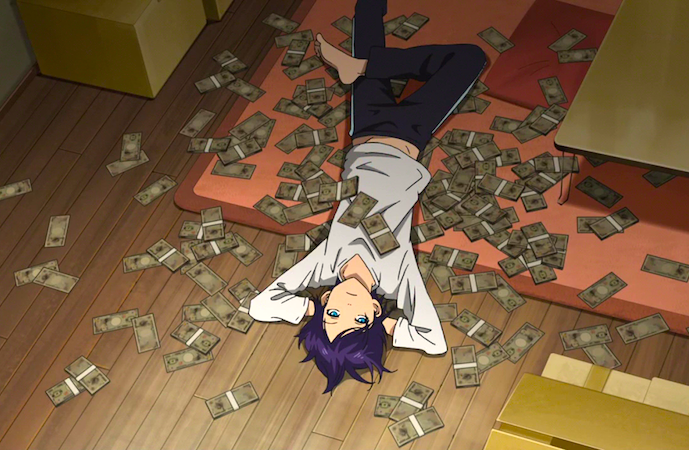Before the article, let me share a personal story. Back in 2014 when I had 20k in savings on my bank account and living expenses paid for by my middle-class parents, I couldn’t motivate myself to work at all.
I was a depressed, socially isolated mess without work experience… then an epiphany hit. I removed all my money from being easily available for personal expenses, by investing them into equity funds.
Adding that extra inconvenient step to accessing the funds, having to sell the stock funds, made me feel broke and desperate to earn a living. I invested everything away with e-banking, so I felt broke despite not being broke.
A year from there, I was running my own business. Which collapsed in spectacular fashion, but I started a new one – this one. All because I felt broke, from not having immediate access to my savings. Financial comfort is corrupting, free resources are like drugs. If you want to find your path in life, get rid of safety nets, or add extra steps to access them. After a while of living like this, your productivity should increase, because you feel it necessary to work.
Without further ado, please enjoy the article. Feel free to debate in the comments. I found the original article on Zerohedge.com.
The “experts” didn’t expect it to turn out this way. An experiment conducted by Harvard University and University of Exeter social scientists found no-strings-attached handouts harmed low-income recipients rather than help them.
Funded by an anonymous nonprofit, the study centered on an experiment in which 2,073 low-income people were randomly selected to receive a single, unconditional cash transfer of either $500 or $2,000. Another 3,170 low-income study subjects received no money from the study.
The experiment was conducted from July 2020 to May 2021. On average, the subjects were earning roughly $950 a month while receiving another $530 in food stamps and other government benefits. A little over half were unemployed and 80% had children.
Over a 15-week period, participants were periodically surveyed about their financial, physical and mental health. Across a wide range of financial and non-financial attributes, researchers found no positive effects on those who received free money — but plenty of negative ones.
For a few weeks, people who received the extra money spent more than the control group — $182 a week for the people who received $500, and $574 a week for the ones given $2,000.
The additional spending didn’t bolster their financial health. The handout recipients reported the same rate of overdraft fees, late-payment charges and cash advances as did those who didn’t receive the extra money. And it was all downhill from there. The handout recipients reported:
- Less earned income
- Less job satisfaction
- Lower work performance
- More financial stress
- Less liquidity
- Worse sleep
- Worse physical health
- More anxiety
- More loneliness
The Wall Street Journal’s Allysia Finley writes:
“It’s no surprise that people who received a large percentage of their monthly income for doing nothing were less motivated to work and less satisfied with their work.
Earning a paycheck can give workers a sense of personal agency that encourages them to make better financial and health decisions. Receiving a handout may do the opposite.”
Significantly, while there was a marked difference between results for the handout recipients and the control group, there was no difference between those who received $500 and those who received $2,000.
Before commencing the study, researchers asked 477 social scientists and policy-makers to predict the outcome. As a group, these “experts” felt the extra money would have a multitude of benefits. They were dead wrong.
Finley isn’t surprised: “Most liberal academics and politicians believe government handouts are the solution to all problems. If transfer payments were a ticket to the middle class, the War on Poverty would have succeeded long ago.”
The study undermines common arguments for universal basic income (UBI), a scheme by which all Americans would receive a monthly income of, say, $1,000, without any requirement to demonstrate need. The concept was elevated to peak prominence by 2020 Democratic presidential hopeful Andrew Yang.
Making the case for UBI in a 2020 Vice article, Brianna Provenzano claimed that recurring, no-strings-attached handouts can “infuse a sense of pride back into an American workforce that has been stripped stripped of its dignity over the years.” The study, however, shows free money actually sapped the recipients’ spirits.
Provenzano argued that free income wouldn’t discourage people from working, because “people want to work, in part because they derive so much of their social value from it.” Since the study’s handout group reported lower earned income, that assumption seems deeply flawed.
Clearly, there’s something good about needing to work. Provenzano is right about the social value people derive from work, but she fails to appreciate how free money lures people away from pursuing and benefitting from it.
Provenzano also enthused that UBI would “imbue workers with enough economic security to turn down a job that they didn’t want to do.” The Harvard-Exeter study found handouts actually undermined financial security. At the same time, the results suggest that those who turn down work they “don’t want to do” aren’t so much empowered to take a different job as they are steered toward greater idleness.
It should be noted that idleness, beyond its detrimental effect on individuals’ financial well-being and sense of self-worth, diminishes their ability to compete for future jobs.


